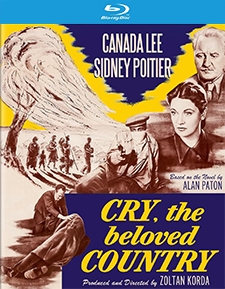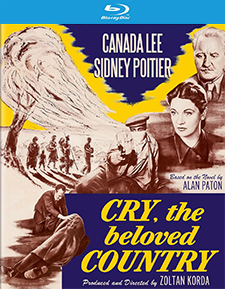Cry, the Beloved Country (Blu-ray Review)

Director
Zoltán KordaRelease Date(s)
1951 (March 11, 2025)Studio(s)
London Films/British Lion Films (Kino Lorber Studio Classics)- Film/Program Grade: A-
- Video Grade: A
- Audio Grade: A-
- Extras Grade: B
Review
The original, 1951 film version of Cry, the Beloved Country, from Alan Paton’s 1948 novel, is remarkable that it exists at all. Prior to the 1980s, few movie companies dared openly criticize South Africa’s racist, oppressive apartheid government; cinematically, it was if that great failure of humankind didn’t exist. Indeed, the only other really good one is the much-underrated The Wilby Conspiracy (1975). The two films couldn’t be more different; Cry, the Beloved Country is a serious drama, the institutionalized racism implicit, whereas Wilby in plain terms exposes apartheid’s brutality more graphically, but often in a grimly comic manner, within the context of an action-packed road movie. Both, coincidentally, feature Sidney Poitier, while Daniel Mann, Wilby’s director, later directed the American Film Theater’s Lost in the Stars, another adaptation of... Cry, the Beloved Country.
In rural South Africa, black minister Stephen Kumalo (Canada Lee) journeys to Johannesburg—he’s never even seen a large city before—to locate and try to help his sister and his son, Absolom, who’ve left their poor village and never returned. He stays at the church of Father Vincent (Geoffrey Keen), where a mix of white and black ministers work to help the city’s poor, segregated blacks. Chiefly, Kumalo is aided by Rev. Msimangu (Poitier, in his second credited film role following No Way Out), a cynical realist. Kumalo quickly locates his missing sister only to find that the single mother turned to prostitution after her husband was imprisoned.
Kumalo and Msimangu then track Kumalo’s son to a reformatory for black youths, but its leader, Martens (Michael Goodliffe) informs them that the young man was recently released for good behavior; Martens, joining them, later discover he’s been absent from work. It turns out that Absolom (Lionel Ngakane) was the trigger man in a botched home invasion robbery that resulted in the murder of Arthur Jarvis (Henry Blumenthal), a prominent white advocate for Black South Africans.
Ironically, the murdered man’s elderly parents, James (Charles Carson) and Margaret (Joyce Carey), hail from Kumalo’s village, James a bigoted landowner who never understood his murdered son’s determination to help black South Africans. An equal part of Cry, the Beloved Country’s story is their journey to Johannesburg to attend their son’s funeral, and James’s gradual recognition of his prejudices through his son’s writings, which had perplexed him and put a strain on their frosty relationship.
Though some of the interiors were filmed at Shepperton Studios in England, extensive location filming was done in South Africa, Canada Lee and Sidney Poitier masquerading as director Zoltán Korda’s indentured servants to circumvent segregation laws. The original novel was written just months before apartheid officially began, and even by 1951, other than the poverty, the most extreme prejudices and injustices of the system aren’t apparent in the picture, though they’re certainly implied. Yet the mere novelty of seeing the conditions there at the time, captured forever on film, alone make the film worth watching.
Though some local talent seems to have been cast with non-actors, the professionals are uniformly excellent. This was the last film of Canada Lee, Banquo in Orson Welles’s celebrated “Voodoo” Macbeth and Bigger Thomas in Welles’s later Native Son, and probably best remembered now for Hitchcock’s Lifeboat (1944); he died the following year, shortly after being blacklisted and called before the House Un-American Activities Committee. His performance here is heartfelt and intense, if somewhat one-note—he’s deeply troubled in the opening scenes, deeply troubled at the end. But the mere novelty of an English-language feature film for mass audiences in 1951 in which a black man is at the center of things is certainly worthy of praise, and Lee is compelling in his internal agony.
Poitier, too, is fine, his youthfulness and handsome features, marred by cynicism about the future—at one point he decides his discontentment hardly makes him an ideal clergyman—contrasts Lee’s character nicely. Charles Carson, really the second lead, and Joyce Carey are also fine as the grieving parents but, for me, the performance that really stood out was busy character actor Michael Goodliffe as the head of the reform school, who struggles to make sense of Absolom’s crime.
Licensed from Studio Canal, Kino’s Blu-ray of Cry, the Beloved Country was restored in 4K primarily using the original nitrate camera negative, augmented with internegative and 35mm reversal material. Longer running times are sometimes given than this 95-minute version, but this seems to be a complete cut of the version released theatrically in 1952. (Likewise, it lacks a screen credit for blacklisted co-writer John Howard Lawson.) Regardless, the 1.37:1 standard, black-and-white image looks sensational, hardly a nearly 75-year-old movie. The DTS-HD Master Audio (2.0 mono) is also quite strong, though some allowances should be made for the location scenes; I frequently activated the subtitles to catch all the dialogue. Optional English subtitles are provided. Region “A” encoded.
Supplements consist of a new audio commentary by film historian Daniel Kremer, and Canada Lee: An Interview with Mona Z. Smith, it running 35:51.
Cry, the Beloved Country is fascinating and not to be missed. Highly recommended.
- Stuart Galbraith IV

